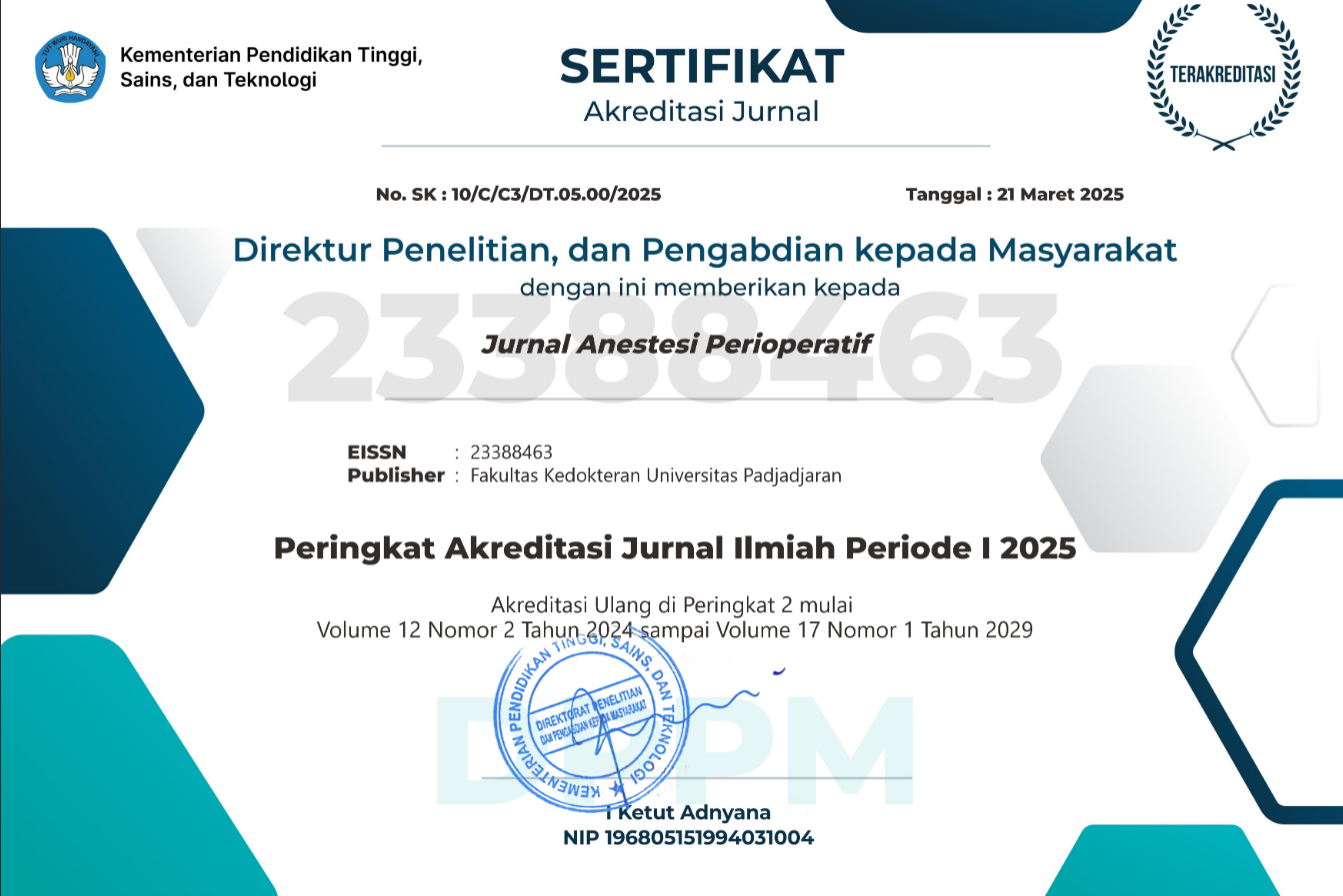Waktu Pulih Sadar pada Pasien Pediatrik yang Menjalani Anestesi Umum di Rumah Sakit Dr. Hasan Sadikin Bandung
Abstract
Salah satu komplikasi utama pasca-anestesia pada pediatrik adalah keterlambatan pulih sadar. Penyebab keterlambatan pulih sadar pasca-anestesia adalah efek residual dari obat anestetik, sedatif, analgesik, durasi anestesi, dan hipotermia. Penelitian ini bertujuan mengetahui waktu pulih sadar pada pasien pediatrik yang menjalani anestesia umum di Rumah Sakit Dr. Hasan Sadikin Bandung dengan metode penelitian adalah observasional prospektif. Penelitian dilakukan pada bulan Mei–Agustus 2014 dengan sampel sebanyak 456 pasien pediatrik yang menjalani anestesia umum terdiri atas 3,9% neonatus, 24,6% infant, 17,3% batita, dan 54,2% anak. Parameter yang dicatat pada penelitian ini adalah usia, jenis kelamin, berat badan, jenis anestesia inhalasi, dosis fentanil, durasi anestesia, dan suhu inti tubuh pasca-anestesia. Data penelitian dianalisis secara deskriptif dalam ukuran jumlah dan persentase. Hasil penelitian ini adalah angka kejadian keterlambatan pulih sadar pada pasien pediatrik sebanyak 96 kasus (neonatus 16 kasus, infant 51 kasus, batita 12 kasus, dan anak 12 kasus). Faktor yang memengaruhi waktu pulih sadar pada neonatus adalah hipotermia, pada infant adalah dosis fentanil >3 mg/kgBB, pada durasi anestesia >210 menit dan hipotermia, pada batita adalah hipotermia, dan pada anak adalah dosis fentanil >5 µg/kgBB dan hipotermia. Simpulan, hipotermia merupakan faktor penyebab keterlambatan waktu pulih sadar pada semua kelompok usia.
Kata kunci: Pasca-anestesi, pediatrik, waktu pulih sadar
Recovery Time in Pediatric Patients Undergoing General Anesthesia in Dr. Hasan Sadikin General Hospital Bandung
The most common causes of prolong awakening are residual effects of drugs either anesthetics, sedatives or analgesics, length of anesthesia, and hypothermia. This study aimed to determine the recovery time to consciousness in pediatric patients undergoing general anesthesia in Dr. Hasan Sadikin General Hospital Bandung. This was an observational prospective study conducted in May until August 2014 on 456 patients consisting of 3.9% neonates, 24.6% infants, 17.3% toddlers and 54.2% children. Parameters recorded in this study were age, sex, weight, type of inhalation anesthetics, fentanyl dose, duration of anesthesia, and post-anesthesia temperature. Data were analyzed descriptively in number and percentage. The results showed that the average recovery time to consciousness in neonatal patients was 50 minutes 40 seconds in which 88.3% of the neonatal age group suffered from post anesthesia hypothermia (core body temperature below 36⁰C). Factors that influenced recovery time in infants were fentanyl dose above 3 µg/kgBW, duration of anesthesia over 210 minutes, and hypothermia. The factors that caused delayed recovery were hypothermia in toddlers group and fentanyl doses above 5 µg/kgBW and hypothermia in children. Incidence of prolong awakening in pediatric patients undergoing general anesthesia in this study was 96 cases, consisting of 16 cases of neonates, 51 cases of infants, 12 cases of toddlers, and 17 cases of children. In conclusion, the common factor causing delay in recovery in all age groups is hypothermia.
Key words: Post-anesthesia, pediatric, recovery time
Keywords
Full Text:
PDFArticle Metrics
Abstract view : 4649 timesPDF - 3825 times
This Journal indexed by

JAP is licensed under a Creative Commons Attribution-NonCommercial 4.0 International License
View My Stats



